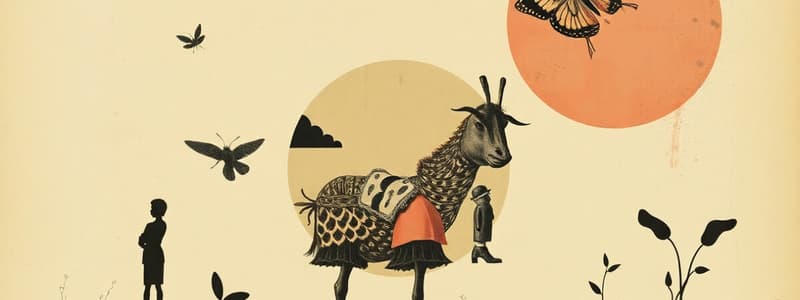Podcast
Questions and Answers
Which process describes the way prokaryotes divide?
Which process describes the way prokaryotes divide?
- Fragmentation
- Vegetative propagation
- Binary fission (correct)
- Budding
A homozygous individual has two different versions of the same gene.
A homozygous individual has two different versions of the same gene.
False (B)
What is the term for the joining of an egg and a sperm?
What is the term for the joining of an egg and a sperm?
fertilization
_________ is when plants produce new individuals directly from the parent organism.
_________ is when plants produce new individuals directly from the parent organism.
Which of the following is an example of asexual reproduction?
Which of the following is an example of asexual reproduction?
Which of the following is a characteristic of asexual reproduction?
Which of the following is a characteristic of asexual reproduction?
Asexual reproduction can occur through the process of binary fission in prokaryotes.
Asexual reproduction can occur through the process of binary fission in prokaryotes.
Match the terms with their definitions:
Match the terms with their definitions:
Name two organisms that reproduce asexually by budding.
Name two organisms that reproduce asexually by budding.
Regeneration refers to the creation of new organisms from separate parts of a mature organism.
Regeneration refers to the creation of new organisms from separate parts of a mature organism.
What type of genetic expression is shown by heterozygous individuals?
What type of genetic expression is shown by heterozygous individuals?
In vegetative propagation, new individuals are produced directly from the __________ organism.
In vegetative propagation, new individuals are produced directly from the __________ organism.
Match the asexual reproduction method to its example:
Match the asexual reproduction method to its example:
What is one disadvantage of asexual reproduction?
What is one disadvantage of asexual reproduction?
Sea stars reproduce asexually by fission.
Sea stars reproduce asexually by fission.
What process involves a part of a mature organism breaking off and developing into a new organism?
What process involves a part of a mature organism breaking off and developing into a new organism?
What is a key advantage of sexual reproduction?
What is a key advantage of sexual reproduction?
Both sperm and egg cells contain the same number of chromosomes as body cells.
Both sperm and egg cells contain the same number of chromosomes as body cells.
Define internal fertilization.
Define internal fertilization.
In sexual reproduction, offspring inherit ___ of their DNA from each parent.
In sexual reproduction, offspring inherit ___ of their DNA from each parent.
Match the reproductive processes with their descriptions:
Match the reproductive processes with their descriptions:
Which of the following organisms primarily reproduce asexually?
Which of the following organisms primarily reproduce asexually?
Energy is not a concern in sexual reproduction compared to asexual reproduction.
Energy is not a concern in sexual reproduction compared to asexual reproduction.
What is the primary role of gametes in reproduction?
What is the primary role of gametes in reproduction?
Flashcards are hidden until you start studying
Study Notes
Asexual Reproduction Requirements
- Asexual reproduction involves only one parent
- There is no fertilization or gamete formation
- The process is quick
- Offspring are genetically identical to the parent
Types of Asexual Reproduction
- Binary Fission: DNA replicates, cell elongates, DNA moves to opposite poles, cell divides (e.g., E.coli)
- Budding: Cell division occurs at one site, a new individual grows and breaks off (e.g., Hydra, yeast)
- Fragmentation: Part of a mature organism breaks off and develops into a new organism (e.g., fungi, sea sponges, starfish)
- Vegetative propagation: Plants produce new individuals directly from the parent (e.g., runners in strawberry plants, plantlets in spider plants)
Advantages and Disadvantages of Asexual Reproduction
- Advantages:
- Quick reproduction
- Offspring inherit beneficial traits
- Disadvantages:
- Limited adaptability to environmental changes
- Offspring inherit harmful traits
Sexual Reproduction Requirements
- Involves two parents
- More complex organisms (e.g., humans, animals)
Sex Cells (Gametes)
- Sperm and egg cells are haploid (half the number of chromosomes as a body cell)
Fertilization
- Internal fertilization: Syngamy (union of male and female gametes) occurs inside the female body
- External fertilization: Syngamy occurs outside the female body, typically in water
Zygote Development
- After fertilization, a zygote forms and undergoes mitosis, increasing the number of cells
Genetic Inheritance
- Offspring inherit 50% of their nuclear DNA from the mother and 50% from the father
Genetic Variation in Sexual Reproduction
- The mixing of alleles from both parents during fertilization results in genetic diversity
Advantages and Disadvantages of Sexual Reproduction
- Advantages:
- Genetic variation and increased adaptability
- Disadvantages:
- Requires energy for mating, gestation, and offspring care
Comparing Plant and Animal Reproduction
- While both plants and animals can reproduce asexually or sexually, asexual reproduction is more common in plants
Sex-Linked Genes
- Characteristics influenced by genes carried on sex chromosomes (e.g., X and Y chromosomes)
- Manifest differently in female and male offspring due to the difference in their sex chromosomes
Studying That Suits You
Use AI to generate personalized quizzes and flashcards to suit your learning preferences.




